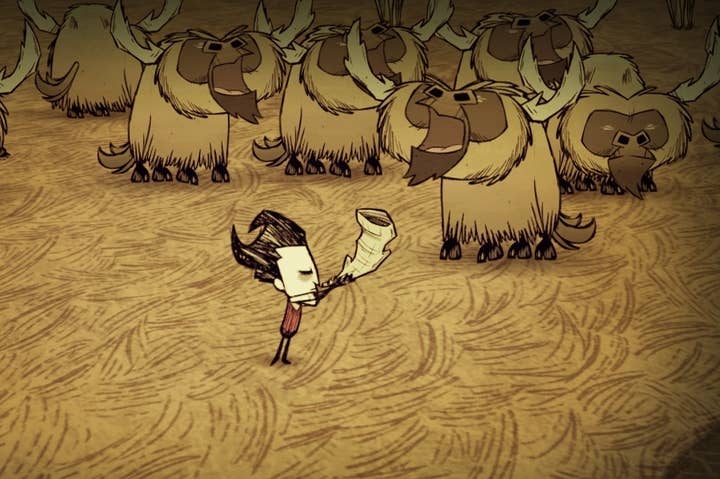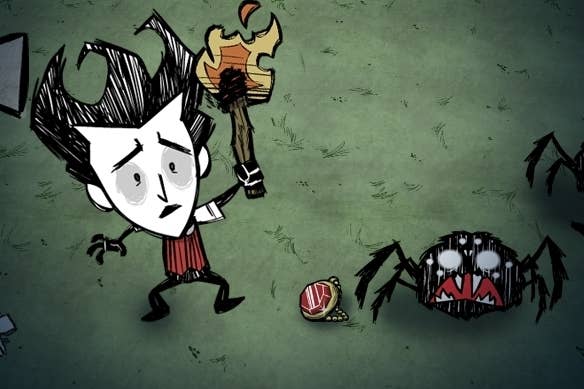Don't Starve: Klei's grand experiment
The science and magic of developing a game with your community
Speaking from the Klei Entertainment offices in Vancouver, founder Jamie Cheng is as surprised as anyone at the popularity of its wilderness survival game Don't Starve. "Even the success now was something we didn't expect, there was nothing in our projections like that."
Don't Starve breaks all the rules, dropping different characters - a scientist, a haunted child, a robot - into a creepy world of pig men, hunting and exploration, and then leaving them to figure out how to survive. There are no quests, no signposts, just a series of accidents, deaths and brilliant discoveries. The look is coloured pencils meets creepy naturalist's notebook, and the content is mad in the best possible way.

The game is still in open beta and won't be finished until March, but thanks to Klei's careful attentions and clever business model (from free in the early days to paid beta to codes to share with friends) already has a thriving community that devotes hours to writing guides, making videos and scrawling beautiful fan art. Not bad for something that started life as part of a 48 hour game jam.
"Don't Starve was basically our grand experiment, that's how we saw it," says Cheng.
"We had our other games, Mark Of The Ninja and that kind of thing, and those projects are about 18 months long. For Don't Starve we had this idea, and it started as a game jam, we built it over two days and we really enjoyed the idea. And that was back in 2010, the end of 2010."
"So fast forward a couple of years and and we've got the opportunity and the timeframe to build this game. But we weren't sure how exactly it was going to turn out, so we decided that we're going to get it out as soon as we can and get people playing as soon as we can."
And that's how the game ended up sneaking onto the Chrome store, a free little oddity. Klei gave itself 6 months to get that working build out, and set itself a rigid schedule to add updates every two weeks. New characters to unlock, new hazards in the world, tweaks to food systems. As a player it's satisfying to feel the game growing around you. For Klei it allows it to get realtime feedback on the development process - and find out what players think about shaving sleeping buffalo creatures in the dead of night.
"I didn't get into games to be the lowest common denominator, I wanted to do something different"
"From a business perspective I felt like if we can build a strong community and we can test with the players as we go along we'll have a much better chance of that spreading over time."
The process hasn't been without mis-steps. The world now is a giant sandbox, filled with wonders and oddities that you stumble on completely alone, but at one point the development team wanted to add quests. It was a huge mistake, and one Cheng has written about in some detail at Penny Arcade.
"For our game especially, having external goals is extremely counter to what is fun about the game."
But these risks and experimentation seem to be what Cheng is all about, he seems to have an actual aversion to the same old, same old approach that is such a big part of the industry today.
"I can't speak to larger companies, because I've never run one, but what I can say is that for us it was important for us to have freedom to be able to do the things we wanted to do, and from a business perspective it was a specific goal for me to start to build our company so that we had leeway to try different things."
Klei runs multiple projects at once to spread risk, and ensures it has a steady stream of royalties to make sure those projects are supported.
"Let's try things knowing that we'll fail. Knowing that we can fail and keep on trying new things. So that was our strategy, creatively you need that leeway. As everyone knows in the industry the quality of the game is what matters in the end, if you put out a shitty game, you're probably going to be out of business. So you need that leeway."
As for selling a game based around chopping wood and building science machines to an audience more used to shooting men and... shooting men, Cheng reveals it hasn't been as difficult as you might expect.
"Don't Starve is the easiest game to sell I've ever had. People look at the game and they're interested. They want to know more about it. They look at the art and animation and say what is that?" he says.

"Our biggest success has been to let the community tell other people, that has worked out fantastically for us. And we enjoy that, because we get to focus on the game and focus on the community, and that community helps us spread the word."
Cheng loves to play as scientist Wilson, mainly because he can grow a fabulous beard (something Cheng jokes he can't do) but there's also something in the mad scientist character that must appeal to Cheng. This is not a man that wants to do the same things as everyone else.
"From the perspective of should it be more mainstream, I didn't get into games to be the lowest common denominator, I wanted to do something different, and to me that's the biggest risk of all, to be just simply bland."
Don't Starve is due to be completed in March, but is currently available on both the Chrome Store and Steam in beta form.









